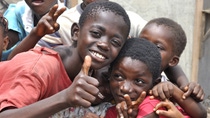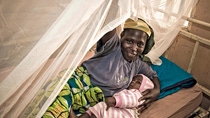Agriculture
Empowering Smallholder Farmers In Cambodia
Retired BASF employee Dr. Walter Zwick has spent many decades working in the field with smallholder farmers in Cambodia, sharing his agricultural expertise and helping train the next generation. Combined with a donation from BASF of 3,000 mosquito nets and financial support to buy new machinery, it is a long-term commitment that is making a real difference to local people’s lives and livelihoods.
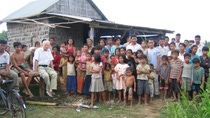
Battambang province in northwest Cambodia is an area of jungle, mountains and fertile land. It has long been known as the country’s “rice bowl”. However, life for smallholder farmers and agricultural workers here can be hard, with many struggling to make ends meet. Water shortages, outdated production techniques and the ever-present risk of catching malaria mean that harvests are often disappointing. Providing food to feed their own families is not easy: many of the children here are malnourished.
Malaria is just one of the problems the farmers face, but it has been proven to be the biggest barrier to prosperity in many emerging economies. Although much progress has been made in the last decade toward combating malaria, in this part of Cambodia it is still endemic. On average people catch the disease as many as five times a year. For smallholders, that can mean losing several weeks work during critical periods in the agricultural cycle, resulting in a significantly reduced harvest. The knock-on effects are grave: the chances are increased of families being unable to feed themselves properly, while for the children the consequences of malnourishment and missing school hamper their prospects far into the future.
Giving help and sharing knowledge
Dr. Walter Zwick, a retired BASF agriculture expert, has spent many years working with local farmers in Battambang to help improve their lives and livelihoods. Since retiring from BASF in 1999, he has worked for the Senior Expert Service, spending several months a year in Cambodia sharing his knowledge and experience.
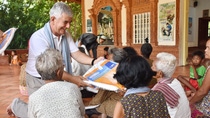
However, helping arrange this donation is just one small part of Zwick’s long-term commitment to the region. Thanks to Zwick’s commitment, BASF has recently donated 3,000 Interceptor® long-lasting, insecticide-treated mosquito nets to the area. By reducing the risk of catching the debilitating disease, mosquito nets help ensure that farmers can work their fields, and their children can attend school. The nets have been distributed to local low-income families as well as to those affected by recent floods in the border area between Cambodia and Laos.
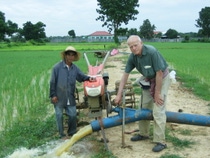
A focus of his work has for many years been the Don Bosco Technical School in Phnom Penh and its model farm in Battambang. With the help of Zwick’s advice, the farm has improved production techniques and significantly increased its rice yields. A drying machine has been built and, with Zwick’s encouragement, the farm has also started growing vegetables as well as keeping fish, cattle, swine and poultry. He has even helped introduce the production of biogas from animal waste.
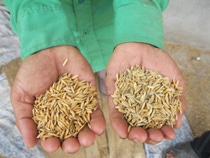
The model farm now produces enough food to provide up to 800 meals a day for the local school children. This has dual benefits – it means the children get nutritious meals and attend school more frequently.
An investment in the future
“Looking to the next generation is essential if the improvements that have been made to date in the area are to be sustained long-term,” says Zwick. That is why he has also devoted much time to supporting the agricultural training center, where young farmers learn and put into practice new techniques, as well as training to fit new agricultural machinery. Financial support to buy a seed cleaning machine has also been provided by BASF.
It’s not only Cambodia that has benefited from Zwick’s commitment and experience over the years. He has also worked with the Senior Expert Service in Myanmar, the Philippines, and Belorussia, helping to improve agricultural methods and outcomes for farmers. In 2017 he was awarded the Order of Merit of the Federal Republic of Germany as recognition for his 14 years of service as a senior expert and agricultural advisor in Asia.
Success, according to Zwick depends to a great extent on the approach taken. “It’s not about imposing ideas from the outside, but about exchanging knowledge and understanding, and working with people on an equal footing,” he says. “With commitment like that, real change can be made for the better.”
